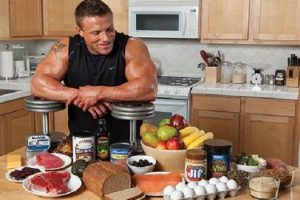In the realm of exercise and diet, the significance of maintaining optimal water balance and preventing dehydration cannot be overstated. As individuals engage in physical activities, the body undergoes various processes that demand efficient hydration. This comprehensive exploration delves into the intricate relationship between exercise, diet, and the essential elements of water and electrolytes. From understanding the physiological mechanisms at play to practical strategies for hydration, this article aims to provide a profound understanding of how proper fluid balance is paramount for overall health and athletic performance.
The Physiology of Hydration
Before delving into the specifics of water and electrolytes, it’s crucial to grasp the physiological importance of hydration during exercise. The human body is composed of approximately 60% water, highlighting its fundamental role in various bodily functions. During physical activity, the body sweats to regulate temperature, leading to the loss of fluids and electrolytes. Understanding this intricate dance between exertion and hydration is key to devising effective strategies for maintaining water balance.
- Sweat and Temperature Regulation: Sweating is the body’s natural cooling mechanism. As the sweat evaporates from the skin’s surface, it dissipates heat, preventing overheating during exercise. However, this process results in the loss of water and electrolytes, necessitating replenishment to sustain optimal bodily functions.
- Blood Volume and Oxygen Transport: Adequate hydration is vital for maintaining blood volume, ensuring efficient oxygen transport to working muscles. Dehydration can lead to a reduction in blood volume, compromising oxygen delivery and, subsequently, impairing overall exercise performance.
Water: The Foundation of Hydration
Water serves as the foundation for maintaining hydration during exercise. While it may seem straightforward, the nuances of proper water intake deserve careful consideration for individuals seeking to optimize their physical performance and well-being.
- Individual Hydration Needs: The amount of water an individual requires depends on various factors, including body weight, climate, exercise intensity, and individual sweat rates. A one-size-fits-all approach does not suffice, emphasizing the importance of tailoring hydration strategies to individual needs.
- Pre-Exercise Hydration: Adequate pre-exercise hydration is crucial for starting physical activities with a fluid reserve. Consuming approximately 16-20 ounces of water 2-3 hours before exercise, and an additional 8-10 ounces 20-30 minutes before, can help ensure optimal hydration status.
- During Exercise Hydration: The rate of fluid loss during exercise varies, with factors like temperature and exercise intensity playing pivotal roles. Monitoring sweat rate and replenishing fluids accordingly is essential. Consuming 7-10 ounces of water every 10-20 minutes during exercise can serve as a general guideline.
- Post-Exercise Hydration: Rehydration after exercise is paramount to replenish fluid losses. Aim to consume 16-24 ounces of water for every pound of body weight lost during exercise. Including electrolytes in post-exercise rehydration can enhance fluid retention and restore electrolyte balance.
Electrolytes: Balancing Act for Performance
Electrolytes are minerals with an electric charge, including sodium, potassium, calcium, and magnesium. They play a crucial role in maintaining fluid balance, nerve function, and muscle contractions. As individuals engage in physical activities, the loss of electrolytes through sweat necessitates strategic replenishment.
- Sodium and Chloride: Sodium and chloride, both components of table salt, are the primary electrolytes lost in sweat. Adequate sodium intake is particularly vital for maintaining fluid balance and preventing hyponatremia, a condition characterized by low blood sodium levels.
- Potassium: Potassium is essential for nerve impulses and muscle contractions. While the loss of potassium in sweat is lower compared to sodium, it still requires attention, especially for individuals engaged in prolonged or intense exercise.
- Calcium and Magnesium: These electrolytes are crucial for bone health, muscle function, and overall cellular activities. While their loss through sweat is relatively minimal, ensuring a well-balanced diet that includes these minerals is essential for overall health and performance.
Signs of Dehydration and Overhydration
Recognizing the signs of both dehydration and overhydration is imperative for maintaining a healthy fluid balance during exercise.
- Dehydration Signs: Thirst, dark yellow urine, dizziness, fatigue, and decreased urine output are common indicators of dehydration. Monitoring these signs during and after exercise can prompt timely intervention to prevent further dehydration.
- Overhydration Signs: Hyponatremia, or water intoxication, occurs when there’s an imbalance between water intake and sodium levels. Symptoms include nausea, headache, confusion, and in severe cases, seizures and coma. It’s crucial to strike a balance and avoid excessive water intake.
Tailoring Hydration Strategies to Exercise Types
Different forms of exercise may necessitate varying hydration strategies. Understanding these nuances allows individuals to tailor their approach based on their specific athletic endeavors.
- Endurance Exercise: Athletes engaged in prolonged activities, such as marathon running or cycling, require meticulous hydration planning. Regular fluid intake, along with electrolyte-rich beverages or supplements, is vital to sustain performance and prevent dehydration.
- Strength Training: While strength training may not result in as much fluid loss as endurance exercise, maintaining hydration is still crucial for optimal muscle function and recovery. Adequate water intake and electrolyte replenishment contribute to sustained strength and power during resistance training.
- High-Intensity Interval Training (HIIT): HIIT workouts often lead to significant sweat loss due to their intense nature. Tailoring hydration strategies to the duration and intensity of intervals is essential for preventing dehydration and optimizing performance.
Hydration and Dietary Considerations
The role of diet in supporting hydration cannot be overlooked. Dietary choices can complement hydration strategies, contributing to overall fluid balance.
- Water-Rich Foods: Incorporating water-rich foods, such as fruits and vegetables, into the diet provides additional hydration. These foods not only contribute to fluid intake but also offer essential vitamins, minerals, and antioxidants.
- Caffeine and Alcohol: Caffeine and alcohol can contribute to dehydration, as they have diuretic effects. While moderate consumption may not pose significant issues, individuals should be mindful of their overall fluid intake, especially when engaging in physical activities.
Individual Variability and Hydration Plans
Individual variability plays a significant role in devising effective hydration plans. Factors such as age, gender, fitness level, and climate influence fluid requirements, emphasizing the need for personalized approaches.
- Age and Fitness Level: Older individuals may have reduced thirst sensation, making it crucial for them to consciously monitor their fluid intake. Fitness level also influences sweat rates, with trained individuals often sweating more efficiently.
- Climate Considerations: Hot and humid conditions result in increased sweat rates, elevating the risk of dehydration. Adjusting fluid intake based on climate conditions is essential for preventing heat-related illnesses and optimizing performance.
Conclusion: Hydration as a Cornerstone of Performance
In conclusion, the interplay between exercise, diet, water, and electrolytes is intricate and multifaceted. Recognizing the importance of maintaining water balance and preventing dehydration is not just a matter of quenching thirst; it’s a cornerstone of optimal health and athletic performance. From understanding the physiological mechanisms to tailoring hydration strategies based on individual needs and exercise types, individuals can navigate this intricate terrain with knowledge and precision.
To unlock the full potential of their bodies,individuals must adopt a holistic approach to hydration that extends beyond the mere consumption of water. Proper fluid balance is about optimizing physiological processes, enhancing performance, and safeguarding overall well-being. Therefore, to truly harness the benefits of a well-structured hydration strategy, it’s essential to continue exploring the following key aspects.
Monitoring and Adjusting
One of the most critical aspects of effective hydration is the ability to monitor and adjust fluid intake as circumstances change. This involves staying attuned to your body’s signals and making real-time adjustments to your hydration plan.
- Thirst Sensation: Thirst is the body’s natural signal for water intake. While it’s a reliable indicator for many, some individuals, particularly older adults, may experience a diminished sense of thirst. In such cases, it becomes even more crucial to establish a structured hydration routine rather than relying solely on thirst.
- Sweat Rate: Understanding your own sweat rate can be invaluable. Weighing yourself before and after exercise can help estimate how much fluid you’ve lost. For every pound of body weight lost, aim to replenish with approximately 16-24 ounces of fluid.
- Climate and Environment: Different climates and environments pose varying hydration challenges. Hot and humid conditions demand more significant fluid intake to compensate for increased sweat rates, while cold environments may decrease the perception of thirst. Being aware of these factors and adjusting your hydration plan accordingly is essential.
Electrolyte Supplementation
For individuals engaging in prolonged and intense physical activities, especially endurance athletes, electrolyte supplementation becomes a vital component of their hydration strategy. Electrolyte-rich sports drinks, gels, and supplements can help maintain proper electrolyte balance and prevent issues such as muscle cramps.
- Sodium Intake: During extended exercise, sodium losses can be substantial. Sports drinks that contain sodium help replace these losses and prevent hyponatremia. It’s crucial to choose products that provide an appropriate balance of electrolytes to match your specific needs.
- Individual Tolerance: Some individuals may be more sensitive to electrolyte imbalances than others. It’s important to determine your own tolerance and preference for electrolyte supplements through trial and error during training, rather than experimenting during a competitive event.
- Timing: Consuming electrolyte-rich products should align with your exercise duration. For shorter activities, water may suffice, while longer endurance events may require continuous intake of sports drinks or gels.
Replenishing Glycogen Stores
Glycogen, the stored form of carbohydrates in the body, plays a crucial role in sustained energy during exercise. Ensuring that glycogen stores are replenished is integral to performance and recovery.
- Carbohydrate Intake: Along with hydration, consuming carbohydrates post-exercise is essential for refilling glycogen stores. Combining a carbohydrate source with electrolytes in your post-exercise meal or snack aids in recovery and prepares the body for subsequent activities.
- Balanced Meals: Incorporating well-rounded, balanced meals that include carbohydrates, proteins, and healthy fats provides a holistic approach to recovery and sustained energy. The timing and composition of these meals should be aligned with your training schedule and dietary preferences.
Hydration and Health
Beyond athletic performance, proper hydration has far-reaching implications for overall health and well-being. Dehydration can lead to a range of health issues, including kidney stones, urinary tract infections, and constipation. Therefore, maintaining hydration is not only about exercise but also about preserving the body’s vital functions.
- Daily Hydration: Even on non-exercise days, individuals should strive to meet their daily hydration needs. Sipping water throughout the day, choosing water-rich foods, and being mindful of fluid intake is crucial.
- Medical Considerations: Some medical conditions, such as diabetes and kidney diseases, can impact fluid balance. It’s essential for individuals with such conditions to work closely with healthcare providers to develop tailored hydration strategies.
- Special Populations: Pregnant individuals, infants, and the elderly may have unique hydration needs that require special attention. Understanding these specific requirements and ensuring proper hydration is vital for their health and well-being.
Continual Learning and Adaptation
The field of exercise, diet, and hydration is dynamic and continually evolving. As new research emerges, individuals must stay informed and adapt their strategies accordingly. Keeping up with the latest insights can lead to more effective and personalized approaches to hydration.
- Professional Guidance: Consulting with nutritionists, dietitians, and sports scientists can provide valuable insights and personalized guidance for hydration strategies. They can help individuals tailor their plans to their specific goals and needs.
- Experimentation: Every individual’s body responds uniquely to different hydration strategies. It’s important to view your hydration plan as a dynamic process and be open to experimenting with various approaches to find what works best for you.
- Holistic Approach: Recognize that the interplay between exercise, diet, water, and electrolytes is an integral part of a holistic approach to health and fitness. As you continue your journey, strive to integrate these elements seamlessly into your lifestyle.
In essence, the intricate web of exercise, diet, water, and electrolytes forms the backbone of optimal athletic performance and overall well-being. Understanding the nuances and interrelationships of these elements, along with monitoring and adapting your strategies, allows you to unlock your full potential and achieve your health and fitness goals. Hydration, far from being a mere afterthought, should be a central pillar of your journey towards a healthier, fitter, and more resilient self.





Add Comment